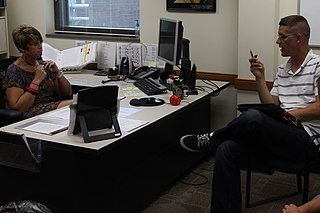Related Research Articles

Vocational education is education that prepares people to a skilled craft as an artisan, trade as a tradesperson, or work as a technician. Vocational Education can also be seen as that type of education given to an individual to prepare that individual to be gainfully employed or self employed with requisite skill. Vocational education is known by a variety of names, depending on the country concerned, including career and technical education, or acronyms such as TVET and TAFE.
Professional development, also known as professional education, is learning that leads to or emphasizes education in a specific professional career field or builds practical job applicable skills emphasizing praxis in addition to the transferable skills and theoretical academic knowledge found in traditional liberal arts and pure sciences education. It is used to earn or maintain professional credentials such as professional certifications or academic degrees through formal coursework at institutions known as professional schools, or attending conferences and informal learning opportunities to strengthen or gain new skills.

Apprenticeship is a system for training a new generation of practitioners of a trade or profession with on-the-job training and often some accompanying study. Apprenticeships can also enable practitioners to gain a license to practice in a regulated occupation. Most of their training is done while working for an employer who helps the apprentices learn their trade or profession, in exchange for their continued labor for an agreed period after they have achieved measurable competencies.
National Vocational Qualifications (NVQs) are practical work-based awards in England, Wales and Northern Ireland that are achieved through assessment and training. The regulatory framework supporting NVQs was withdrawn in 2015 and replaced by the Regulated Qualifications Framework (RQF), although the term "NVQ" may be used in RQF qualifications if they "are based on recognised occupational standards, work-based and/or simulated work-based assessment and where they confer occupational competence".
Further education in the United Kingdom and Ireland is additional education to that received at secondary school that is distinct from the higher education (HE) offered in universities and other academic institutions. It may be at any level in compulsory secondary education, from entry to higher level qualifications such as awards, certificates, diplomas and other vocational, competency-based qualifications through awarding organisations including City and Guilds, Edexcel (BTEC) and OCR. FE colleges may also offer HE qualifications such as HNC, HND, foundation degree or PGCE. The colleges are also a large service provider for apprenticeships where most of the training takes place at the apprentices' workplace, supplemented with day release into college.

Counseling psychology is a psychological specialty that began with a focus on vocational counseling, but later moved its emphasis to adjustment counseling, and then expanded to cover all normal psychology psychotherapy.

The Further Education and Training Awards Council or FETAC was a statutory qualification-awarding body for further education in Ireland. It was established on 11 June 2001 under the Qualifications Act 1999. FETAC was dissolved and its functions were passed to Quality and Qualifications Ireland (QQI) on 6 November 2012.
A national qualifications framework (NQF) is a formal system describing qualifications. 47 countries participating in the Bologna Process are committed to producing a national qualifications framework. Other countries not part of this process also have national qualifications frameworks.
Recognition of prior learning (RPL), prior learning assessment (PLA), or prior learning assessment and recognition (PLAR), describes a process used by regulatory bodies, adult learning centres, career development practitioners, military organizations, human resources professionals, employers, training institutions, colleges and universities around the world to evaluate skills and knowledge acquired outside the classroom for the purpose of recognizing competence against a given set of standards, competencies, or learning outcomes. RPL is practiced in many countries for a variety of purposes, for example an individual's standing in a profession, trades qualifications, academic achievement, recruitment, performance management, career and succession planning.
A licensed clinical professional counselor (LCPC) is a professional who has been qualified to provide psychotherapy and other counselling services. LCPCs are trained to work with individuals, families, and groups to treat mental, behavioural and emotional problems and disorders. The main goal of LCPCs is to use counselling strategies to help people live a more satisfying life, which typically involves identifying a goal and finding potential solutions.

The Technical Education and Skills Development Authority serves as the Philippines' Technical Vocational Education and Training (TVET) authority. As a government agency, TESDA is tasked to both manage and supervise the Philippines' Technical Education and Skills Development (TESD). Its goals are to develop the Filipino workforce with "world-class competence and positive work values" and to provide quality technical-educational and skills development through its direction, policies, and programs.
Global Career Development Facilitator (GCDF) is a certification from the Center for Credentialing and Education (CCE), a Certification Entity, for persons working in career development and advisory fields. There is an official list of CCE Approved Providers of Training cited below. The certification requires over 120 hours plus educational and experience requirements.

Career counseling is a type of advice-giving and support provided by career counselors to their clients, to help the clients manage their journey through life, learning and work changes (career). This includes career exploration, making career choices, managing career changes, lifelong career development and dealing with other career-related issues. There is no agreed definition of career counseling worldwide, mainly due to conceptual, cultural and linguistic differences. However, the terminology of 'career counseling' typically denotes a professional intervention which is conducted either one-on-one or in a small group. Career counseling is related to other types of counseling. What unites all types of professional counseling is the role of practitioners, who combine giving advice on their topic of expertise with counseling techniques that support clients in making complex decisions and facing difficult situations.
The Malaysian Qualifications Framework or the MQF is a unified system of post secondary qualifications offered on a national basis in Malaysia. It is administered by the Malaysian Qualifications Agency (MQA), a statutory body under the purview of the Ministry of Higher Education (MOHE).
The National Training System is the Australian system for vocational education and training (VET) under the Australian Quality Training Framework (AQTF), in which employers, the States of Australia, and the Commonwealth Government, formalise a curriculum available for Registered Training Organisations (RTOs) to teach and assess the competency of students.
A career guide is a group that provides guidance to people facing a variety of career challenges. These challenges may include dealing with redundancy; seeking a course; finding colleges; new job; changing careers; returning to work after a career break; building new skills; personal and professional development; going for promotion; and setting up a business. The common aim of the career guide, whatever the particular situation of the individual being guided, is normally to help that individual gain control of their career and, to some extent, their life.

Vocational rehabilitation, also abbreviated VR or voc rehab, is a process which enables persons with functional, psychological, developmental, cognitive, and emotional disabilities, impairments or health disabilities to overcome barriers to accessing, maintaining, or returning to employment or other useful occupations.
The National Careers Service is the publicly funded careers service for adults and young people in England.
The Youth Employment Service was a British government agency from the 1950s to the 1970s, aimed at school-leavers (teenagers).
Apprenticeships have a long tradition in the United Kingdom, dating back to around the 12th century. They flourished in the 14th century and were expanded during the industrial revolution. In modern times, apprenticeships were formalised in 1964 by act of parliament and they continue to be in widespread use to this day.
References
- ↑ Anita Houghton Finding Square Holes: Discover Who You Really Are and Find the Perfect Career
- ↑ "Global Career Development Facilitator | GCDF".
- ↑ "Educational and Vocational Guidance Practitioner". Archived from the original on 2015-05-02. Retrieved 2015-06-08.
- ↑ Ed. David Peck Careers Services: History, Policy and Practice in the United Kingdom
- ↑ Watts et al: Rethinking Careers Education and Guidance: Theory Policy and Practice
- ↑ AG Watts & Gareth Dent "Let your Fingers do the Walking": the Use of Telephone Helplines in Career Information and Guidance, "Archived copy" (PDF). Archived from the original (PDF) on 2004-07-10. Retrieved 2010-05-19.
{{cite web}}: CS1 maint: archived copy as title (link) - ↑ Erik de Haan & Yvonne Burger: Coaching with colleagues: an action guide to one-to-one learning
- ↑ O'Connell, B; Palmer, S. (2003), Introduction to the Solution-Focused Approach, Sage. London
- ↑ Peter Plant: Quality in Careers Guidance, http://www.oecd.org/dataoecd/35/47/2698228.pdf